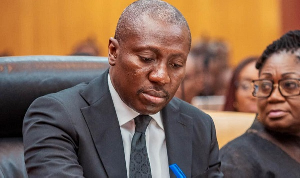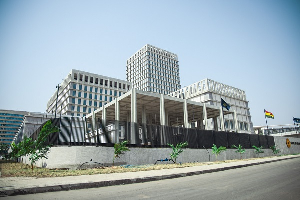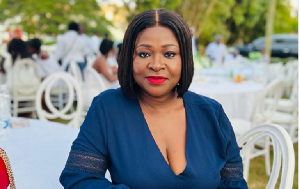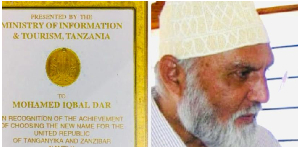The PDA was introduced in 1958 after many years of what we will today describe as acts of terrorism. Between 1954 and 1957, violence, murders and bombings, orchestrated largely by the National Liberation Movement (NLM), attended much of the political life in the Gold Coast. However, as we explain later in this article, the single incident that triggered the introduction of preventive detention, first proposed by the late Krobo Edusei (after seeing a copy of the Indian Act on preventive detention), whose own sister had been killed in an act of NLM terrorism and whose wife had been the victim of an N.L.M bomb blast, was the planned assassination of the Prime Minister by Modesto Apaloo, R.R. Amponsah and Captain Awhaitey.
There are some on the United Party (U.P.) side of this argument who trace the origins of the violence of that period to the now infamous incident on 9th October 1955 when a quarrel broke out between C.P.P. and N.L.M. supporters in a house in Ashanti New Town, Kumasi. According to Dennis Austin, the quarrel “led to blows and E.Y. Baffoe was stabbed to death by K.A. Twumasi Ankrah who had recently been reinstated as regional propaganda secretary for the C.P.P.” Twumasi Ankrah was later charged, tried and hanged for this offence but the N.L.M. put it about that he was acting with the imprimatur of the C.P.P. leadership and used this as justification for much of their acts of terror.
Their claim, however, that the N.L.M. was a peaceful nationalist movement until the infamous incident does not fit with the facts and is an attempt to rewrite history. R.J. Vile, the Assistant Secretary and Head of West Africa Department B at the Colonial Office gave one of the first independent assessments of the N.L.M. after his visit to the Gold Coast in March 1955. In a memorandum – ‘Constitutional developments in the Gold Coast’ (Ref: CO 554/805, no 22) - on his visit to the Gold Coast he wrote this (in Paragraph 11): “So little is known about the internal politics of the N.L.M. that it is difficult to know the importance of this core determined people, or the kind of control exercised by the Ashantehene [sic] over them. It is, however, clear that they have a fair amount of dynamite at their disposal and presumably can easily obtain fresh supplies by theft from the mines. They contain a number of thugs who are prepared to use knives and arms of precision. Reports were current in Kumasi a fortnight ago that the N.L.M. had been smuggling in rifles and machine-guns, and there were other reports that small bands of people were being trained with the object of sending them to Accra to attack, and possibly murder, Gold Coast Ministers.”
In paragraph 12, R.J. Vile writes: “It is possible that Dr. Nkrumah’s peaceful approach (described in paragraph 10) may lead to the resolution of the differences between the N.L.M. and the C.P.P. on constitutional matters”. Nevertheless he concluded, ominously, that “it is quite possible that the core of determined young men will take to the forest and engage in guerrilla warfare from there if other methods fail”. The idea then, of a peaceful N.L.M. before the E.Y. Baffoe incident, which took place some six months after R.J. Vile’s memorandum is fanciful and pure fiction.
Prominent amongst the N.L.M.’s victims were C.E. Osei, Krobo Edusei’s wife (Mary Akuamoah) and sister; Archie Caseley-Hayford and Kwame Nkrumah whose houses were targets for bombings at one time or another, and the Governor, Sir Charles Arden-Clarke, whose car was pelted with stones when he went to Kumasi to mediate and seek an end to the violence.
The aim of much of this orchestrated violence was to make the country ungovernable so that the Colonial Office would have little choice but to intervene and delay progress towards the granting of independence.
Less than a year after independence, and after three defeats at the polls in 1951, 1954 and 1956, four prominent members of the U.P. were involved in either undermining the stability of the new Ghana or planning a coup to overthrow the C.P.P. government. In November 1957, only eight months after independence, S.G. Antor and Kojo Ayeke two leading U.P. supporters, were arrested and charged with complicity in the Alavanyo riots in Transvolta Togoland, which took place during the independence ceremonies.
In 1958, Modesto Apaloo and R.R. Amponsah (General Secretary of the N.L.M., and later the combined opposition parties, the U.P.) were implicated in plotting the first coup in the new Ghana with Captain Awhaitey, Commandant of the Giffard Camp (now Burma Camp).
The long-standing and broad basis of the connection between Awhaitey and the Opposition came out clearly during the Court Martial of Captain Awhaitey. For example, according to Geoffrey Bing (in his book "Reap The Whirlwind"), evidence presented at the tribunal showed “that in November and December [1958] he [Awhaitey] was using a green Wolseley car which belonged to a then prominent Opposition Member of Parliament, Victor Owusu, whom, after the coup, the National Liberation Council (N.L.C.) appointed as Attorney General. Awhaitey certainly had the car and was involved in an accident with it, after which it was repaired at Amponsah's request…”. General Paley [the British General then commanding the Ghana Armed Forces] reinforced this connection in his evidence to the tribunal when he confirmed that the car was indeed the one found in front of Awhaitey's house at the time of his arrest.
According to Geoffrey Bing, "In the period immediately preceding Awhaitey's arrest there had been rumours of an army coup d'etat and there was even a Special Branch report in regard to it. Its source was a conversation in a foreign Embassy in Accra which had been allegedly overhead by a non-Ghanaian guest who reported it to the police. According to this report, Dr. J. B. Danquah had been heard assuring a diplomat, known to be not particularly friendly to the C.P.P. Government that everything was planned and that Dr. Nkrumah would be overthrown by Christmas by the Army. In view of the status of the informant, the report was taken seriously enough by the Special Branch and General Paley for there to be a thorough investigation made as to whether there was any possibility of the army planning a coup d'etat.” Needless to say, these investigations did not uncover anything untoward at the time and Dr. J.B Danquah went on to appear as counsel for Amponsah, Apaloo and Dr. Busia before the Granville Sharp Commission of enquiry set up to investigate matters disclosed at the Court Martial of Captain Awhaitey.
The Granville Sharp Commission produced three reports (see proceedings and report of the Commission appointed to inquire into the matters disclosed at the trial of Captain Benjamin Awhaitey before a Court Martial and the surrounding circumstances):
Majority of the Commission, Sir Tsibu Darku and Mr. Maurice Charles (a West Indian and one of a small number of judges maintained in office by the N.L.C. after the coup) found "that Awhaitey, Mr. Amponsah, Mr. Apaloo and Mr. John Mensah Anthony, were engaged in a conspiracy to assassinate the Prime Minister, Dr. Kwame Nkrumah, and carry out a coup d'etat...".
Mr. Justice Granville Sharp in his minority report found that “there did not exist between Amponsah, Apaloo and Awhaitey a plot to interfere in any way with the life of the Prime Minister on the airport before his departure for India."
The third unanimous Report (by all commission members) found “that Amponsah and Apaloo since June 1958, were engaged in a conspiracy to carry out at some future date in Ghana an act for unlawful purpose, revolutionary in character.”
The violence did not, however, end there: numerous attempts were made on Nkrumah’s life in the years following the introduction of the PDA, including the infamous Kulungugu bomb outrage, the bomb outrages in late 1961 that preceded the visit of Her Majesty Queen Elizabeth II in 1962, and the repeated assassination attempts on Nkrumah throughout the early 1960s and especially in 1962 and 1964. By the fifth assassination attempt on Nkrumah's life, a death toll of 30 Ghanaians, men, women and children, had been recorded with the wounding of some 300 others.
Revisionist historians will have us believe the no member of the opposition was ever involved in the bombing campaigns, yet it is a matter of record that an opposition Member of Parliament, R.B Otchere, and Yaw Manu, an activist, pleaded guilty for their role in the Kulungugu bomb. This is what Dennis Austin wrote (see “Politics in Ghana 1946-1960”, published 1964): “That the [Kulungugu bomb] plots had been hatched in Lome and elsewhere by former opposition members – notably Obetsebi Lamptey – was clear. And, indeed Otchere [R.B.] pleaded guilty. But that Tawia Adamafio, Ako Adjei or Coffie Crabbe had anything to do with the Kulungugu attack became increasingly doubtful as the trial continued. And on 9 December all three were acquitted. No one who examined the evidence could have supposed the verdict would be otherwise. Nevertheless, on 11 December, Nkrumah – acting within the terms of the constitution- dismissed Arku Korsah as Chief Justice… and on December 25th Nkrumah declared the judgement null and void”. The consequence of Nkrumah’s response to the trial was that the opposition members who had pleaded guilty and were convicted by a court presided over by Van Lare, Akuffo Addo and the Chief Justice, had their death sentences quashed. In the subsequent trial ordered by Nkrumah, those who were acquitted in the original one were convicted. With the passage of time, all honest observers of our history accept that Tawia Adamafio, Ako Adjei and Coffie Crabbe were treated unjustly. But to conclude from their convictions in the retrial, that they were the bomb plotters is not only unfair to their reputations and memory; it is simply dishonest. The number of people arrested under the Act was so exaggerated that the N.L.C. had to release common criminals with PDA detainees after the coup in 1966 to confirm this falsehood. According to Geoffrey Bing, “of the seven hundred and eighty-eight [788] detained persons that were released [after the coup in 1966], [some] three hundred and fifty to four hundred [350-400]" were criminal detainees "apparently let loose for the purely propaganda purpose of increasing the total number freed". This led to an embarrassing upsurge in crimes rates in the country after the coup.
How was Ghana to deal with the high levels of intolerable violence?
Each country in the midst of a terrorist crisis has a set of emergency laws that are similar to the PDA. In operational terms, the concept of preventive detention has been in existence since British rule in India and elsewhere in other colonies. For example, the U.G.C.C leaders (the so-called Big Six) arrested after the 1948 riots in the Gold Coast were technically held in preventive custody and were neither charged nor tried.
After 1947, both India and Pakistan adopted prevention detention statutes to bring this long-standing practice within the purview of their judicial systems and constitutions. In the Indian Constitution, this comes under Article 22-“Protection against arrest and detention in certain cases” specifically denies anyone held in preventive custody the fundamental rights set out in clauses (1) and (2). Article 22 clause (3b) specifically states: “Nothing in clauses (1) and (2) [i.e. protection from arbitrary arrest and detention, the right to consult and to be defended by, a legal counsel of choice] shall apply to any person who is arrested or detained under any law providing for preventive detention”.
In the United Kingdom for example, The Prevention of Terrorism Action (PTA), allowed for detention without trial, charge or access to legal counsel for a period, has been in force since the early 1970s. Since 9/11, both the US and UK governments have introduced anti-terrorist legislation, much of which has created a conducive atmosphere for preventive detention and some would argue, encouraged the flagrant breaches of human rights witnessed or alleged in the notorious Abu Ghraib prison in Baghdad and the detention camps of Guantanamo Bay.
The UK’s “Anti-terrorism, Crime and Security Act of 2001” allowed non-UK nationals to be detained without charge or trial for an indefinite period of time, if the Home Secretary believed such a person was a national security risk and a suspected "international terrorist who could not be deported. According to Amnesty International, the “only body which [could] review the executive decision is the Special Immigration Appeals Commission” which “can hold hearings in secret, can exclude the detainee and their lawyer from parts of the hearings, and can base its decision on secret evidence.”
The reason for this, according to the then Home Secretary, is that suspected "terrorists" cannot be easily convicted because of "the strict rules on the admissibility of evidence in the criminal justice system of the United Kingdom and the high standard of proof required". In his view, these high standards of proof have to be set aside in the interest of national security. A view echoed by Geoffrey Bing in his book [Reap the Whirlwind] in which he demonstrates how difficult it was under British law – the basis of much of Ghana’s legal system - to get common criminals into jail after independence. In fact, under J.K. Harley and A.K. Deku (Commissioner and Deputy of Ghana Police under Nkrumah) much of the police force pleaded with the C.P.P. government to extend the PDA to common hardened criminals by 1960.
The UK’s “Anti-terrorism, Crime and Security Act of 2001” has since replaced indefinite detention of foreign nationals with a system of "control orders" which can be brought "against any suspected terrorist, whether a UK national or a non-UK national, whatever the nature of the terrorist activity (international or domestic)." Control orders, which can be imposed for as long as 12 months renewable, are, according to the UK Home Office "preventative orders which impose one or more obligations upon an individual which are designed to prevent, restrict or disrupt his or her involvement in terrorism-related activity. This could, for example, include measures ranging from a ban on the use of communications equipment to a restriction on an individual’s movement" .
The Australian Anti‑Terrorism Act of 2005 allows “a person to be taken into custody and detained for a short period of time in order to:(a) prevent an imminent terrorist act occurring; or (b) preserve evidence of, or relating to, a recent terrorist act. Similar legislations have come into force across OECD countries since September 11, 2001.
Arguably, the PDA may have fallen into misuse or may have been abused on occasions, as when some people settled local disputes by making serious but false accusations against their opponents; a peculiar problem which still afflicts the Ghanaian body politic and leads some people to use security personnel to settle personal scores or as private debt collectors. But no responsible government can ignore the serious but false accusations some fellow Ghanaians were ready to make against their own kith and kin.
This was the case with some twenty-one people detained under the PDA from the Anlo area. As the Djabanor Committee explained in its “Report of the Committee of Enquiry into the Affairs of the Anlo Traditional Area” (1967): “Evidence was given about other exploits and adventures of Kusitor and these led us to have a strong suspicion that Kusitor could have been telling tales about these Anloga people to Ambrose Yankey and his “outfit”. After the evidence of Mr Hans Kofi Boni [it was done in camera] we had no doubt that our suspicions were well founded. In fact Johnny Gbagba Kusitor had much more to do with the detention of his compatriots than he would have us believe. He had land litigation with some people and got them out of the way through Preventive Detention. In conclusion we felt that there is no evidence on which we could reliably hold that Togbi Adeladza was responsible for the detention of his people.”
In view of the foregoing and after the numerous attempts on Nkrumah’s life and those of his Ministers, and the violence of the late 1950s and early 1960s what else was he to do in a legal system ill-equipped to deal with the N.L.M’s/U.P.’s terrorism?
Martin Wolf of the Financial Times observed recently that the length to which terrorists are prepared to go to achieve their aims “creates, in extreme form, the classic liberal dilemma - how do people who believe in freedom respond to those who would use that tolerance to threaten it?” It is a delicate matter of balancing rights with security, but in the end, most fair-minded liberals will accept, however reluctantly, that there was a powerful argument for preventive detention in the Awhaitey case at least.
The outcome of the Granville Sharp Commission provides a perfect illustration of this argument. As Geoffrey Bing explains (pp. 265, ibid), “no Government could be expected to release individuals whom majority of a quasi-Judicial Tribunal had found were engaged in a plot to murder the head of the Government. On the other hand, it was almost certain that no successful prosecution could be launched against those concerned when a Judge of the Court of Appeal had come to the conclusion that, though they had been involved in the conspiracy, it was impossible to determine what this conspiracy was and that they had abandoned their plans, whatever they were, prior to the date on which they were to be carried out”.
Setting aside the fact that majority of the Commission found the accused guilty of conspiracy to assassinate the Prime Minister, how was a responsible Government expected to react to Justice Sharp’s own conclusion that Amponsah and Apaloo had been part of a conspiracy but had withdrawn from it when they suspected the police had knowledge of their plans? Does the Government set them free and wait until the next plot or conspiracy succeeds? Or, is preventive detention in these circumstances the lesser of two evils?
This requires finely balanced legal and political judgments and in our view, the age-old maxim of fiat justitia, ruat caelum - let justice be done though the heavens should fall; that the law should take its course even if the opposition were shaking the very foundations of the state and plotting to assassinate the Prime Minister – would have been a wholly irresponsible and inappropriate response for a country that was being plunged into violence and on the verge of breaking-up along tribal lines.
In our view, the PDA was a necessary piece of legislation, which, along with the Avoidance of Discrimination Act might - just might - have helped us avoid some of the more dangerous conflicts that we have seen in other parts of the African continent. It served to quickly isolate potential and real leaders of violent and destabilising acts and safeguard the security of the nation and people of Ghana.



















